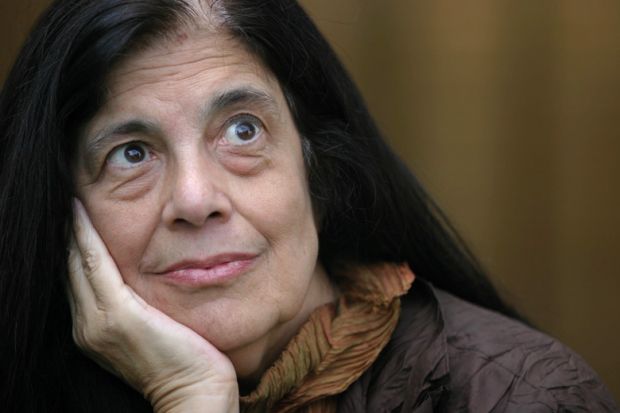In art as in life, and since time immemorial, we humans have confronted yet failed to answer some basic questions: what is death? What does it mean to die? Is there a good or perhaps even a right way to depart from life? And perhaps more practically, at least for the living, what does it mean to grieve for the dead?
In The Violet Hour, Katie Roiphe, an eminent American provocateur, attempts to confront these questions through a seemingly forensic examination of the final days of six writers: Susan Sontag (pictured above), Sigmund Freud, John Updike, Dylan Thomas, Maurice Sendak and James Salter.
Roiphe claims that she “picked people who are madly articulate, who have abundant and extraordinary imaginations or intellectual fierceness, who can put the confrontation with mortality into words…in a way that most of us can’t or won’t”. She briefly mentions the writers she could have chosen – but didn’t – careening wildly from Honoré de Balzac and Franz Kafka, past Virginia Woolf and F. Scott Fitzgerald, to Christopher Hitchens and Primo Levi. However, there is no explanation of why she chose these writers, beyond some inexplicable whimsy.
Despite this authorly caprice, some familiar archetypes appear: Sontag the fighter, Freud the stern analyst, Thomas the voracious devourer of life hurtling towards death. On occasion, Roiphe offers beguiling detail: Sontag’s son racked with doubt over his dying mother’s wishes; Thomas lying bloated in a hospital bed, his passing watched by New York’s literati; the pettily cruel competition – so familiar even to us lesser mortals – between Updike’s wives, even at his death bed. Yet beyond these fleeting, poignant moments, the book offers little insight into Roiphe herself, the writers she chooses, or indeed into the nature of death or dying.
In some ways, Roiphe sets herself an impossible task. The writers she chooses have written about death and dying in insightful, lucid, luminous ways. Their words have shed greater light on this most pedestrian yet mysterious of human experiences than any examination of their lives ever could. In comparison, her ruminations about her own childhood illness and her father’s death lack power and urgency. In part this is due to her prose style, which foregrounds an exhausting impulse to centre the authorial voice. This is ably aided by Roiphe’s remorseless application of the present tense, intended perhaps to grind home death’s all-pervasiveness to the reader.
Early in the book, Roiphe mentions her own childhood obsession with books about genocide, finding in her ailing self “a great, endless appetite” for reading about “people dying in great numbers”. Almost all the authors she has chosen were not only aware of mass deaths but actively grappled with their anonymising, mechanised horrors; here, Roiphe’s focus on the personal disregards the moral and political intensity of their worldviews.
If Roiphe’s aim is to repackage these writers for a clickbait, sentimentalist world, she pulls it off very easily. If the intent is to soften death, market it neatly as a consumable commodity, even make it slightly glamorous, she delivers with a flourish. However, it is her misfortune that the writers she chooses offer better, more passionate, grisly, insightful confrontations with her subject.
Sunny Singh is senior lecturer in English and creative writing at London Metropolitan University, and author of Hotel Arcadia.
The Violet Hour: Great Writers at the End
By Katie Roiphe
Virago, 320pp, £16.99 and £12.99
ISBN 9780349008523 and 8516
Published 5 May 2016
POSTSCRIPT:
Print headline: To die and go we know not where
Register to continue
Why register?
- Registration is free and only takes a moment
- Once registered, you can read 3 articles a month
- Sign up for our newsletter
Subscribe
Or subscribe for unlimited access to:
- Unlimited access to news, views, insights & reviews
- Digital editions
- Digital access to THE’s university and college rankings analysis
Already registered or a current subscriber?




